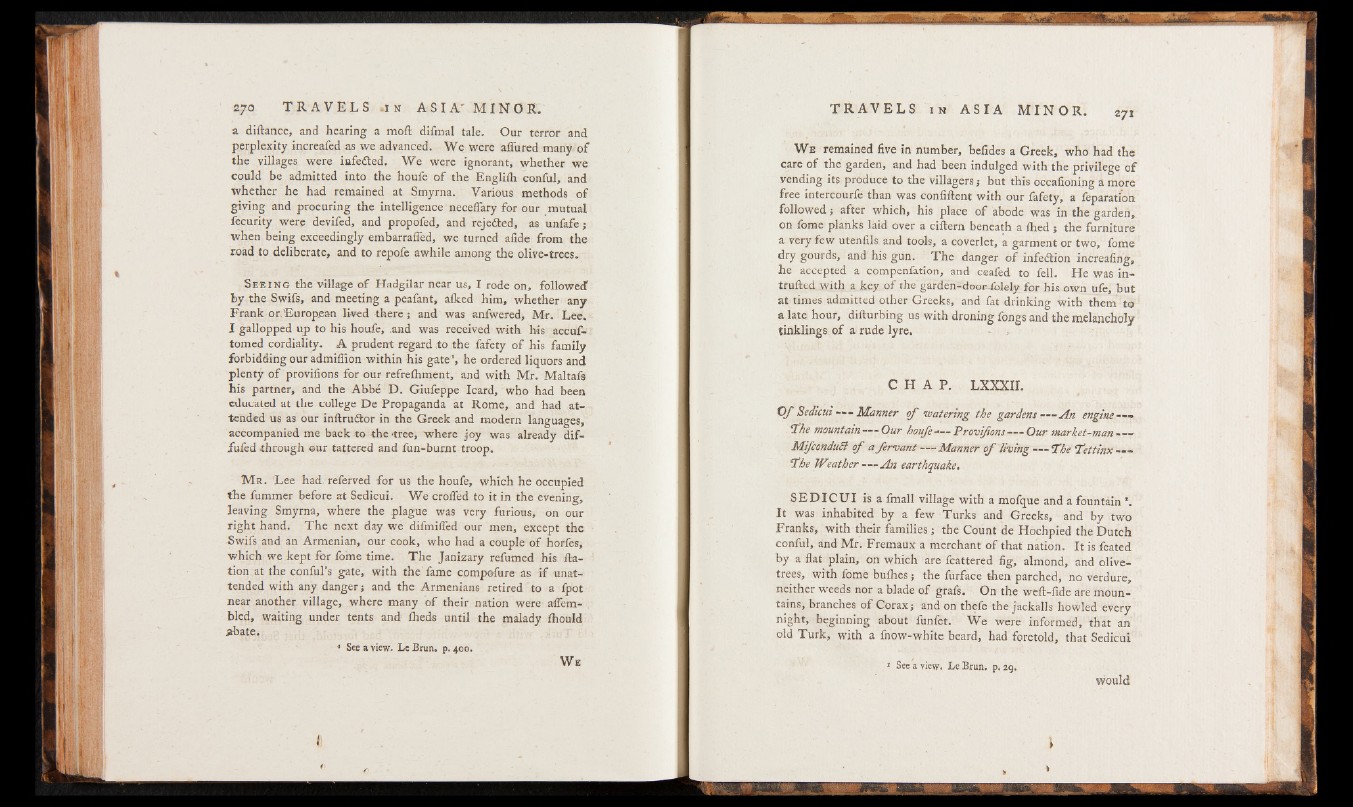
a diftance, and hearing a moil difmal tale. Our terror and
perplexity increafed as we advanced. We were allured many o f
the villages were infedted, We were ignorant, whether we
could be admitted into the houfe of the Engliih conful, and
whether he had remained at Smyrna. Various methods of
giving and procuring the intelligence neceflary for our mutual
fecurity were devifed, and propofed, and rejedted, as unfafe;
when being exceedingly embarrafled, we turned afide from the
road to deliberate, and to repofe awhile among the olive-trees.
S e e i n g the village of Hadgilar near us, I rode on, followed
by the Swifs, and meeting a peafant, aiked him, whether any
Frank or,'European lived-there; and was anfwered, Mr. Lee.
I gallopped up to his houfe, .and was received with his accuf-
tomed cordiality. A prudent regard ,to the fafety of his family
forbidding our admiffion within his gate", he ordered liquors and
plenty of provifions for our refreflunent, and with Mr. Maltafs
his partner, and the Abbe D. Giufeppe Icard, who had been
educated at the college De Propaganda at Rome, and had attended
us as our inftrudlor in the Greek and modern languages,
accompanied me back to the tree, where joy was already dif-
Jiified through ©nr tattered and fun-burnt troop.
M r . Lee had. referved for us the houfe, which he occupied
the fummer before at Sedicui. We eroded to it in the evening,
leaving Smyrna, where the plague was very furious, on our
right hand. The next day we difmifled our men, except the
Swifs and an Armenian, our cook, who had a couple of horfes,
which we kept f&r fome time. The Janizary refumed his Nation
at the conful’s gate, with the fame compofure as i f unattended
with any danger; and the Armenians retired "to a fpot
near another village, where many of their nation were affem-
bled, waiting under tents and fheds until the malady Ihould
abate..
* See a view. Le Bran. p. 400.
W e
W e remained five in number, befides a Greek, who had the
care of the garden, and had been indulged with the privilege of
vending its produce to the villagers; but this occafioning a more
free intercourle than was confillent with our fafety, a leparation
followed; after which, his place of abode was in the garden,
on fome planks laid over a cillern beneath a Ihed ; the furniture
a very few utenfils and tools, a coverlet, a garment or two, fome
dry gourds, and his gun. The danger of infedtion increafing,
he accepted a compenfation, and ceafed to fell. He was in-
trufled with a key of the garden-door folely for his own ufe, but
at times admitted other Greeks, and fat drinking with them to
a late hour, diflurbing us with droning fongs and the melancholy
tinklings of a rude lyre.
m
i
C H A P . LXXXII.
O f Sedicui — Manner o f watering the gardens— An engine —
^the mountain— Our houfe-— Provifions— Our market-man —
Mifconduci o f afervant — Manner o f living — Phe Tettinx —
fh e Weather — An earthquake,
S E D IC U I is a fmall village with a mofque and a fountain *.
It was inhabited by a few Turks and Greeks, and by two
Franks, with their families; the Count de Hochpied the Dutch
conful, and Mr. Fremaux a merchant of that nation. It is feated
by a flat plain, on which are fcattered fig, almond, and olive-
trees, with fome bulhes; the furface then parched, no verdure,
neither weeds nor a blade of grafs. On the weft-fide are mountains,
branches of Corax; and on thele the jackalls howled every
night, beginning about funfet. We were informed, that an
old Turk, with a fnow-white beard, had foretold, that Sedicui
See a view. L e Bran. p. 29.
would